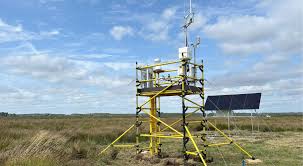The International Water Management Institute (IWMI) has taken an important step to address Pakistan’s water challenges by setting up the country’s first Eddy Covariance (EC) Flux Towers. These have been installed at Khwaja Fareed University of Engineering & Information Technology (KFUEIT) in Rahim Yar Khan, Punjab.
This innovative technology will collect vital data about water usage, carbon emissions, and energy flow from irrigated agricultural areas. The project is part of the Foreign, Commonwealth & Development Office’s (FCDO) Water Resources Accountability Program (WRAP) and CGIAR’s Nexus Gains initiatives. Its goal is to improve water management, boost agricultural sustainability, and help Pakistan adapt to climate change.
The Flux Towers are equipped with advanced sensors that provide real-time data. This will support better decision-making for water conservation and smarter agricultural practices. By understanding how water and energy are used in farming, these towers will help optimize resources and build resilience against the impacts of climate change.
This achievement marks a significant step forward in modernizing water management in Punjab’s agriculture sector. The data gathered by these towers will be critical for shaping strategies to conserve water, reduce carbon footprints, and create a more sustainable future for farming in Pakistan.
IWMI’s efforts highlight the importance of innovative technologies in solving water-related issues and ensuring long-term agricultural and environmental sustainability.


